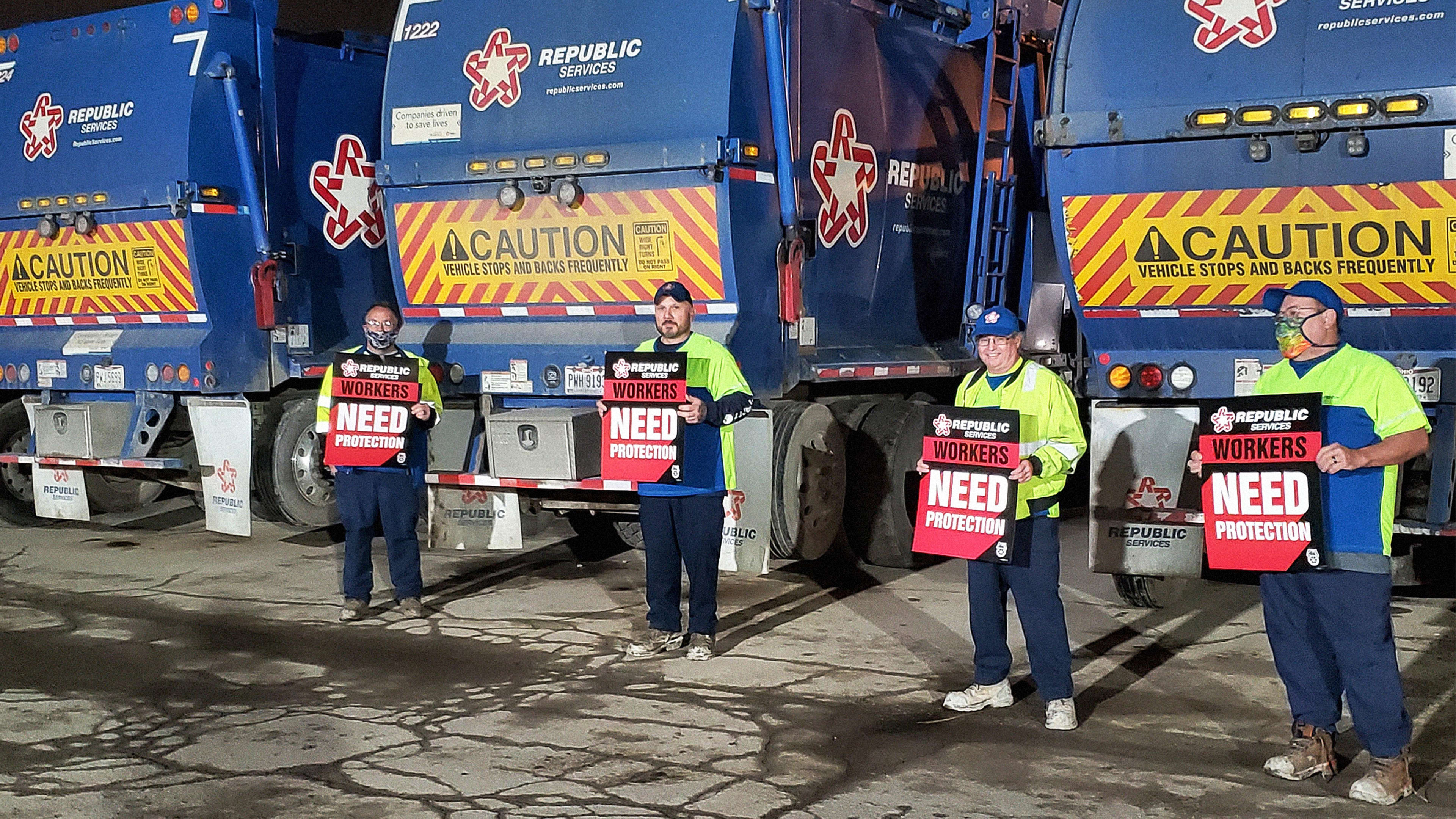Even before the coronavirus pandemic, sanitation work was one of the most dangerous jobs in the U.S. Refuse and recyclable-material collectors rank in the top five occupations for fatal work injuries. The job involves lifting and interacting with heavy and potentially toxic material on any given day. Now, garbage collectors have seen their workload increase as people generate far more residential trash while staying at home. The collectors say that dangerous conditions have increased too, and that their calls for more protections aren’t being answered.
“We don’t feel safe at all,” says Demetrius Tart, a 14-year veteran with Republic Services, one of the largest waste collection providers in the country, and a member of Teamsters 728 in Atlanta. Tart’s work includes residential trash collection, and he says, “The volume of trash has shot through the roof” as millions of Americans stay home. That puts more strain on workers, and Tart fears it puts them at a higher risk of being exposed to COVID-19.
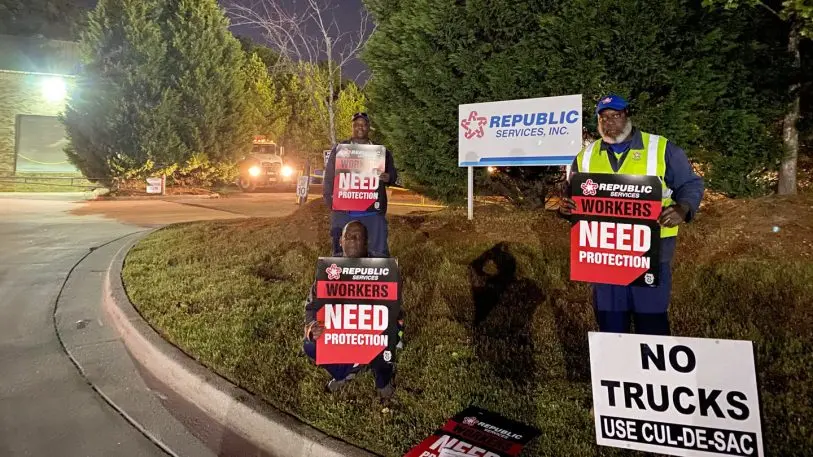
Republic Services workers across the country say they’re lacking necessary safety equipment, including puncture-proof gloves, face masks, protective eyewear, and face shields. Not only is there a risk of touching waste from someone sick with COVID-19; Tart says customers often come close to garbage collectors as they work—sometimes to thank them, which is appreciated, but without protective gear, still worrisome. “I pick up at least 1,100-plus homes a day,” he says. “I don’t know who I’m coming in contact with.”
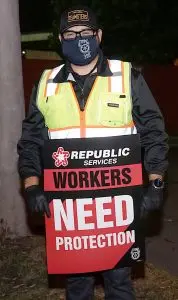
The daily dirty work of “cleaning behind the blades,” when garbage workers have to climb inside truck beds, touching loose trash and “garbage juice” to clean what gets stuck behind the blades that compact the trash, is now even more dangerous, says Chuck Stiles, head of the Teamsters solid waste and recycling division. Soiled diapers from nursing homes, food waste from residential areas—”You’re literally walking in that stuff to clean your truck,” he says. “Stuff is splattering, there’s no protective gear for that whatsoever, no face shields, no Tyvek suits. . . . And then you’re taking that back to your home.”
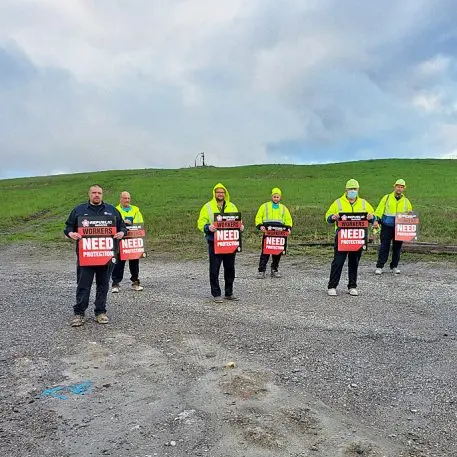
On May Day, Republic Services sanitation workers held six-feet-apart protests outside facilities in California, Massachusetts, Georgia, and Ohio, demanding the company—and especially its largest shareholder, Bill Gates, who owns about 30% of the company—do more to protect workers by providing PPE, improving safety standards, and guaranteeing 40 hours of pay to ensure health insurance coverage.
The company says it has taken steps to keep employees safe, such as providing masks and gloves, expanding benefits, and enhancing cleaning procedures, and that it’s “closely following guidance from the CDC, state and local public health agencies and adhering to OSHA guidelines regarding the safe handling of waste and recycling,” a Republic Services spokesperson said in a statement to Fast Company. Republic Services also says it launched a $20 million “Committed to Serve” initiative, which benefits front-line workers and local businesses through gift cards, purchased meals, and charitable donations.
What Republic Services doesn’t dispute is that there’s more residential trash for these workers to pick up, and that during the pandemic, sanitation workers are more essential than ever. In March, the company said residential trash volumes could increase by 30%, and that the pandemic could affect recycling as well, because contamination will increase and third-party processors may stop operations.
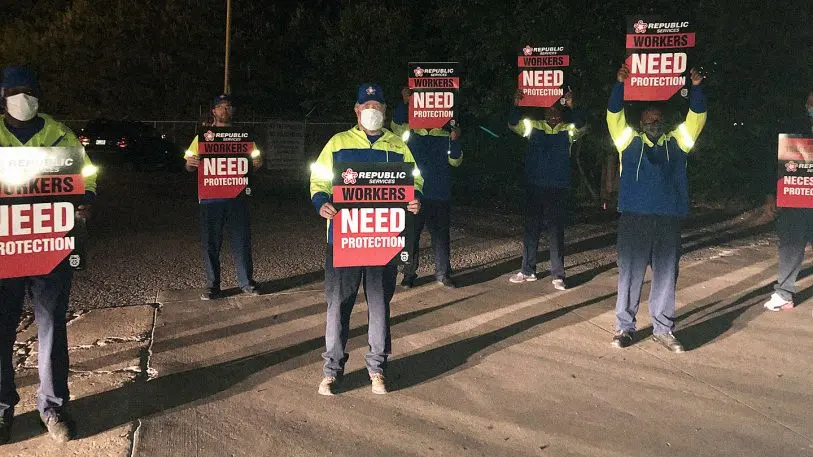
The UN Environment Programme has called waste management an essential public service in the fight to beat COVID-19 and highlighted documents that outline the safe handling of medical waste and the proper management of household waste. Those guidelines are the minimum that countries should do, but Valle-Klann says this pandemic may spur additional policies.
She can imagine, for example, seeing on future annual reports that some countries were exporting more medical waste during the pandemic, because they couldn’t manage it themselves. Just as hospitals have had to learn how to handle COVID-19 patients, countries may have to learn how to handle COVID-19 waste—and update their sanitation technology, preparedness standards, and training for waste management personnel. “These lessons learned can become policy for an update of [those guidelines],” she says, “suggesting how things should be done in the future, in case countries continue to face similar situations.”
Recognize your brand’s excellence by applying to this year’s Brands That Matter Awards before the early-rate deadline, May 3.
